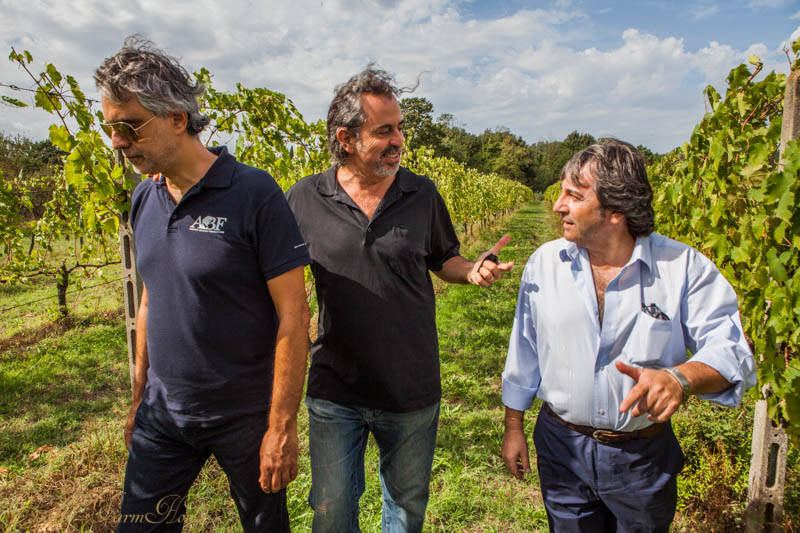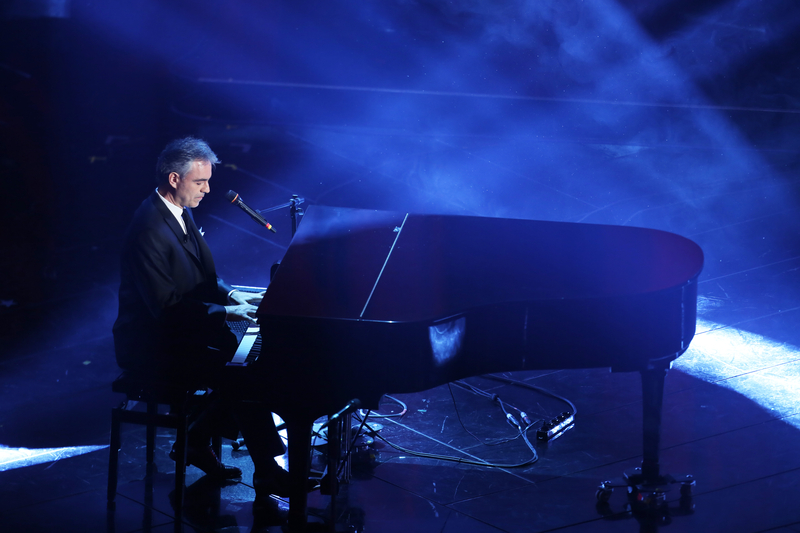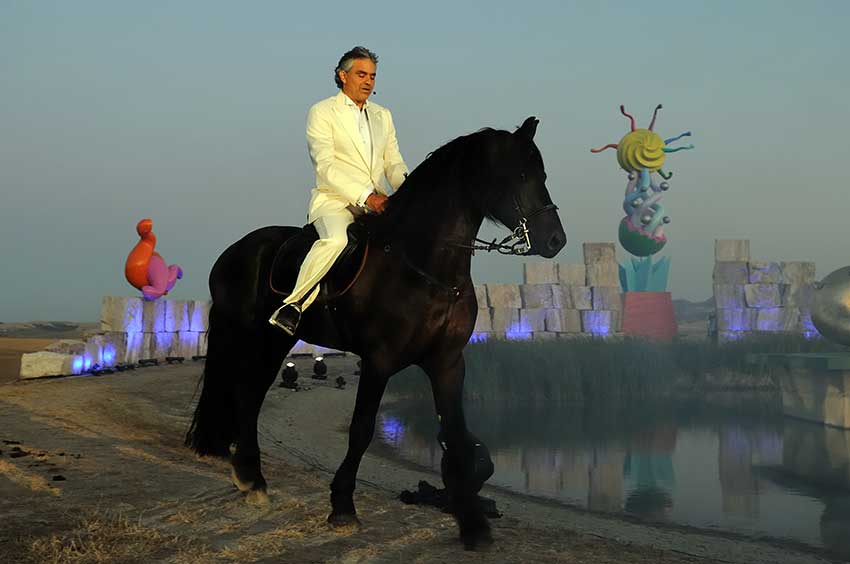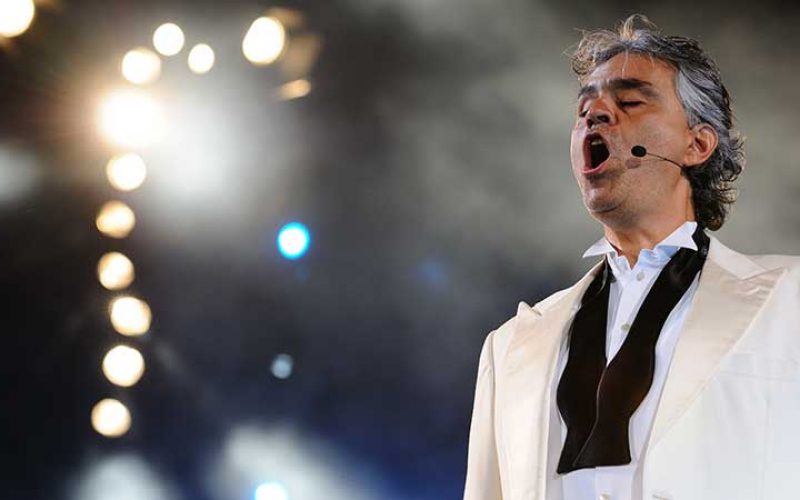The Mojave desert: A warrior raises his sword. Fighter planes soar across the sky. A blind man gallops across the sand.
These images punctuate the music video for Andrea Bocelli’s new album, Cinema, which celebrates the greatest film songs of all time. The album released October 23, 2015. It topped the Classical Crossover Albums chart, making Cinema Bocelli’s eleventh No. 1.
And the blind man galloping across the sand? That’s the maestro himself. He lost his sight as a boy and practiced law as an adult.
He was nearly 40 when his singing career took off.
Andrea Bocelli: “I was thought of as rather different….”
Andrea was born in the Tuscan village of Lajatico, not far from Pisa, on September 22, 1958. It’s an area of intense natural beauty and bounty, carpeted in rolling fields and dotted by tall cedars. Farmers have cultivated olives and grapes here for millennia.
Today Andrea’s younger brother Alberto runs a thriving agro-tourism business from the farmhouse where they grew up. They’re third generation stewards of the land and second generation winemakers.
Their parents, Alessandro and Edi, nurtured this pride for work and family. Even though Andrea was born partially blind, he learned to farm, raise animals, ride horses, and make wine alongside his brother.

During Andrea’s early years, his parents searched endlessly for a cure. His love affair with opera bloomed during yet another restless night in a hospital bed.
Edi noticed Andrea calmed when he pressed his ear to the wall. She walked next door to find the patient, a Russian laborer blinded on the job, listening to classical recordings on his old phonograph.
Andrea began playing piano at age six, but his love of opera made him an outcast. Italian children, it turns out, don’t automatically absorb it. “I was thought of as rather different…they teased a lot,” Andrea remembers.
At age 12, Andrea’s parents sent him to an institute for the blind, where he slept in a dorm room with 64 other children.
The children played soccer with a weighted ball (so they could hear its approach). Andrea was a superb goalie, but he miscalculated one day and the ball hit him on his head, causing a hemorrhage that blinded him completely.
He never let the fact he couldn’t stop that ball stop him and learned Braille to continue his music studies.
Andrea Bocelli: “Love of Art does not guarantee a proper income.”
Although Alessandro and Edi supported Andrea’s musical aspirations, they also “didn’t think it was possible to be happy singing. They wanted me to have a serious education, with real professional opportunities….”
Andrea decided to study law at the University of Pisa, with “maybe a tacit request and pressure from my family.” Using a Braille computer and translation software, Andrea never missed a lecture.
He worked as a court-appointed defense attorney after graduation. At night, he played in piano bars. “I thought it was an intelligent way to get some money and meet some girls.”
His plan worked superbly. The extra money paid for vocal lessons. He met his future wife, Enrica, one night while singing. They married in 1992, when Andrea was 36, and had two sons, Amos and Matteo.
Andrea was playing in a little beach town when Zucchero, the soulful Italian pop star, happened by for a drink. Zucchero recalls, “I wrote a song with the intention of having Pavarotti sing a duet with me.” And he thought Andrea’s voice would be perfect for the demo.
Zucchero sent the song to Pavarotti, but he was booked. Besides, Pavarotti said, “Why do you need me? You already have the right singer.” Pavarotti eventually recorded the song, but Andrea accompanied Zucchero on the tour, where he performed to sold-out venues.
Andrea attended Zucchero’s birthday party later that year. Agent Caterina Caselli heard Andrea sing and immediately signed him. Andrea was 38.

In quick succession, he made his operatic debut in Verdi’s Macbeth and won “best newcomer” in the Sanremo Music Festival (seen by one-third of the households in Italy). His first album entered the Italian Top Ten in weeks.
In 1998, he recorded “The Prayer” with Céline Dion, who commented, “If God could sing, He would sound a lot like Andrea Bocelli.”
His 1999 album, Sacred Arias, has sold more than any other classical album by a solo artist.
By 2000, Andrea Bocelli was an international household name, but his marriage to Enrica didn’t survive the pressure. The couple separated in 2002.
“…the stuff dreams are made of.”
He met his current wife, Veronica Berti, at a party a few months later. Bad weather delayed most of the guests and she ended up by the piano alone. Andrea invited her to his table.
She remembers: “We talked about music and where I was born. I used the formal ‘you’ instead of the friendly ‘you’ and he kept saying to everyone: ‘Why is she speaking to me like that? We are almost the same age.’”
Veronica was 18 and Andrea was 43. She used the polite Italian pronoun of respect. But Andrea knew he’d found something ageless. “Ours was love at first sight.”
The couple moved in together that night. Their daughter, Virginia, was born ten years later. They married on her second birthday. The savvy Veronica acts as his business manager and translator.
Today, Andrea and Veronica live in the seaside village of Forte dei Marmi, where his friend Zucchero grew up. Alberto manages an arm of the Bocelli Family Winery across the road. And ex-wife Enrica lives in a nearby villa with sons Amos and Matteo.
Andrea consults with Alberto on the winery and raises horses. “In the middle of the night, he rides horses,” Veronica says. “He’s crazy. He’s an artist.”
But for Andrea, horses are a spiritual connection to his youth.
The horses came into my life in a big way when I was a child. To me, horses represent strength, elegance and beauty; they were the stuff dreams are made of.

Andrea Bocelli: “Success is just an indigestion.”
Andrea’s “overnight” success came after years playing piano bars. He doesn’t have much regard for the fast-tracked American Idol generation.
It’s dangerous to reach success that way. It’s more important than ever to study and develop the capacity to sacrifice yourself…Otherwise, you are building a castle of sand.
Andrea’s own critics can be vitriolic. Serious opera buffs observe that he came late to classical training. They complain that his breathing falters and his phraseology lacks depth. The grumble that he just sings “popera.”
Andrea, however, recognizes that his fans, not the critics, give his life meaning. “What gives me joy…this is a life I have made with my audience.”
Andrea seldom discusses his blindness in interviews. He would still be singing—and making wine and riding horses—regardless of fame or sight. “Success is just an indigestion,” he observes. A huge meal that makes you feel uncomfortable.
His first wife, Enrica, fathomed his secret: “He belongs to the category of the whimsical, inventing life day after day.”
That’s true success, “late” or not. Inventing life. Day after day.
What say you? Please let me know in the comments!
(Here’s the music video I mentioned in the opening paragraph. It’s a beautiful rendition of “Now We Are Free” from the motion picture Gladiator. John Travolta also makes a cameo.)
Sources
- The Daily Mail. 19 September 2015.
- Chicago Tribune. 11 December 2014.
- The Scotsman. 27 October 2009.
- The Bocelli Farmhouse: Tours and Holidays.
- Andrea Bocelli: A Celebration by Antonia Felix. Macmillan, 2000.
- Opening photo of Andrea © Stefano Marinari | Dreamstime.com.
